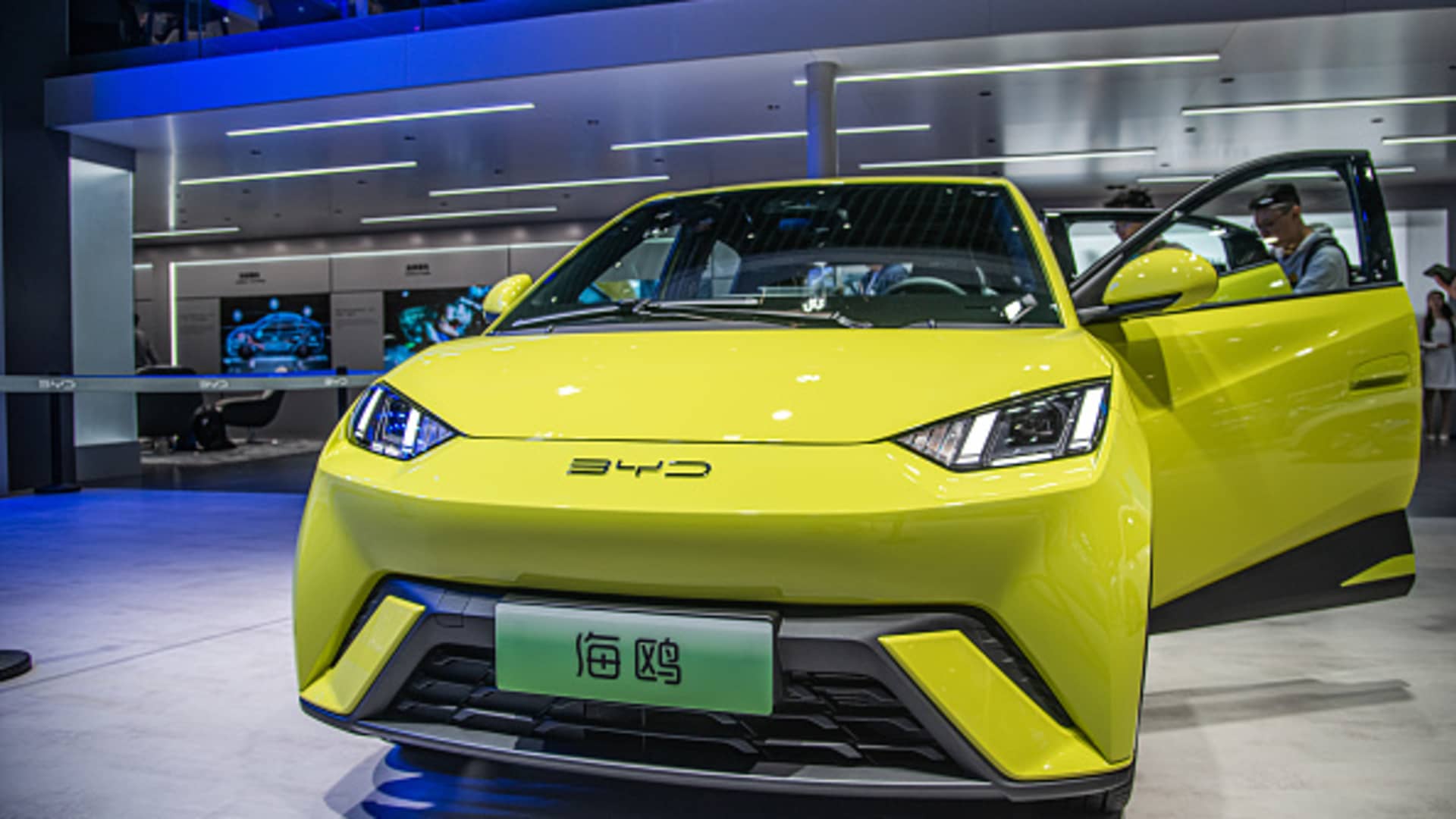A BYD Seagull small electric car is on display during the 20th Shanghai International Automobile Industry Exhibition at the National Exhibition and Convention Center (Shanghai)
Vcg | Visual China Group | Getty Images
Shares of Chinese electric car makers have started the new year in reverse gear, as intense competition and continuing price wars pressure the profitability of automakers, while the overall market sentiment remains weak.
Hong Kong-listed shares of Nio and Xpeng have plummeted more than 18% and 16%, respectively, while Li Auto has lost 12% so far this year. BYD and Zhejiang Leapmotor have shed nearly 2.5% and 12%, respectively, in 2024.
“We expect competition within the domestic market to remain intense and put pressure on pricing and profitability,” Bernstein analysts said in a report on China’s EV industry earlier this month.
Morgan Stanley also highlighted competitions concerns in its note on Wednesday: “Investors remain cautious as China’s auto market has had a volatile start to the year as competition and macro uncertainties persist.”
In mainland China, passenger EV sales growth fell to 28% in the third quarter of 2023, from 108% in the same period a year earlier, according to China Association of Automobile Manufacturers data quoted by Fitch Ratings.
The growth slowdown will deepen in 2024, according to Fitch Ratings. “We expect China’s domestic passenger car demand to increase modestly in 2024 to nearly 22 million units amid economic uncertainty,” said Fitch Ratings.
The slowdown warning comes at a time carmakers have been striving to boost deliveries. Xpeng delivered a record 20,115 EVs in December, 78% higher from a year earlier, while its fourth-quarter deliveries exceeded 60,000 for the first time. Li Auto’s fourth-quarter deliveries stood at 131,805, up 184.6% year over year.
BYD overtook Tesla as the world’s top-selling EV brand in the fourth quarter, selling more battery-powered vehicles than its U.S. rival.
Competition and price wars
Competition is intensifying in the Chinese EV market, with BYD, Li Auto and Geely meeting their sales targets for 2023, and Xpeng and Nio falling short.
“Competitive landscape will be more challenging, and pricing pressure to ensue. Although EV demand is set to remain resilient, the industry will confront three major challenges on the supply side: overcapacity, new model launches and the rise of new tech entrants such as Huawei and Xiaomi, which point to growing competition,” Bernstein said in its note.
In 2024, more than 100 new EV models are expected to launch in China, HSBC China autos analysts said in a December report.
Several domestic EV players such as Nio, Huawei and Zeekr have recently revealed new EVs, with Xpeng launching its latest X9 large 7-seater EV on Jan. 1, intensifying competition. Even Chinese consumer electronics company Xiaomi is set to launch its first EV in an increasingly competitive market.
Last year, Tesla conducted multiple rounds of price cuts, including in China, with domestic rivals BYD, Nio, Li Auto and Xpeng following suit.
“We expect the market to consolidate as a result, with smaller niche EV producers that require capital for development to merge with or be acquired by stronger market participants,” said Fitch Ratings in November.
As Chinese EV makers strive to attract customers through newer offerings and lower prices, their profitability will come under more pressure. In fact, Morgan Stanley has warned that 2024 will be “tougher as … China remains relatively saturated.”
Image and article originally from www.cnbc.com. Read the original article here.

